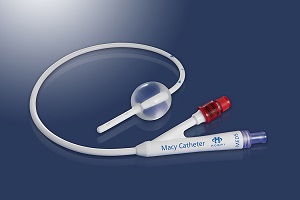 |
| Macy Catheter--Courtesy of Hospi |
In November the federal National Science Foundation awarded a $700,000 research grant to Hospi so that it could expand use of the only FDA-cleared device for rectal delivery of medications. The early results look promising.
Hospi's Macy Catheter has been used predominantly in hospice care settings, but a paper in the American Journal of Emergency Medicine for the first time described three instances of successful use of the drug delivery device in emergency settings at the Advocate Christ Medical Center in Oak Lawn, IL, near Chicago.
In addition, the caregivers write that the device is quick and easy to use, and avoids complications like repeated attempts at vascular access. The Macy Catheter is placed similarly to a standard Foley catheter, but in the rectum rather than the bladder. In addition, using the rectal delivery route, the liquefied or crushed medications (including aspirin, oral acetaminophen and methimazole) were found to take effect in as little as one minute or less.
The patients cited in the paper were too uncooperative, agitated or confused for successful oral administration of medication, and IV access was either unsuccessful or achieved with difficulty. In general, "patients who are volume depleted, with difficult vascular access, and poor oral tolerance are often not sick enough to require central line placement or sedated enough to tolerate intraosseous placement," the Advocate Christ caregivers write.
They conclude that "a novel rectal administration device appears to offer an appealing alternative route to medication and fluid administration for a variety of indications in acute and critical care settings."
The Macy Catheter consists of a dual-port, dual-lumen ballooned tube that is inserted in the rectum. A retention balloon is inflated via the balloon inflation port to hold the device in place.
"We are pleased to learn of continued expanded use of the Macy Catheter in a range of settings for patients with various medical needs," said Hospi president and Macy Catheter inventor Brad Macy in a statement. "We look forward to continuing to develop the Macy Catheter and our supporting products to deliver on our goal of improving quality of life, optimizing patient care, and reducing cost."
A registered nurse, Macy was inspired to invent the device after he delivered liquefied medication into a hospice patient's rectum using a urinary catheter.
- read the release
- read the entire paper and/or the abstract